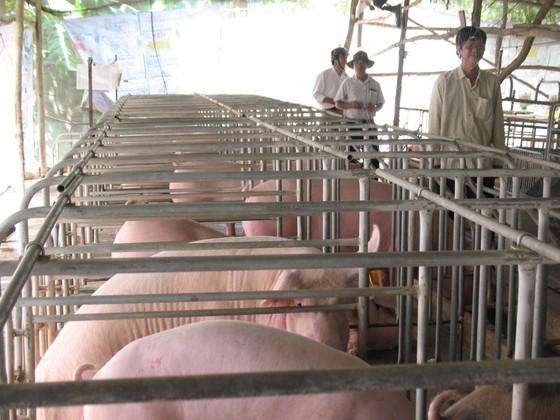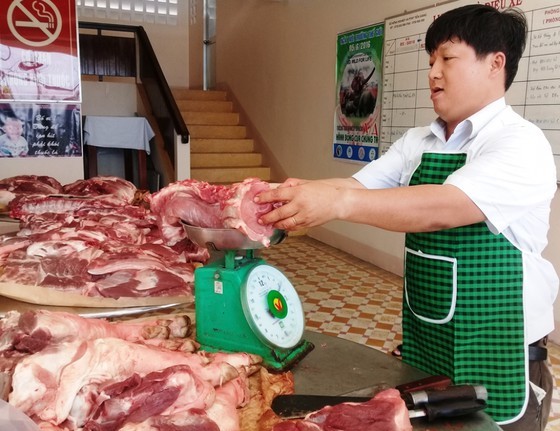
As the daily demand for pork is quite huge, the provincial department made an official dispatch to guide farmers to repopulate their pig herds effectively, preventing the risk of disease recurrence.
Accordingly, An Giang province requires pig-farming facilities and households to strictly apply isolation and disinfection measures by chemicals; upgrade livestock facilities and apply biosafety measures; carry out the animal status declaration for the competent authorities to assess the eligibility before repopulation.
Pig-farming facilities with a pig herd of below 1,500 pigs must make the declaration to the communal People’s Committee. Those with a pig herd of above 1,500 pigs upwards must make the declaration to the provincial Department of Animal Husbandry and Veterinary. The breeding pigs for repopulation must be disease-free and tested for African swine fever periodically.
In Dong Thap Province, Mr. Vo Be Hien, Head of the provincial Department of Animal Husbandry and Veterinary, said that the African swine fever spread widely, causing pig herds to decrease heavily. Moreover, there are not many breeding pigs while their prices are high and the breeding conditions are risky, so the pig repopulation remains sluggish. The total pig herd in the province was around 400,000-600,000 pigs per year, now has reduced to 70,000-90,000 pigs.
Therefore, the province promotes pig repopulation to serve the demand of local people and provide for other provinces. Pig repopulation will focus on reducing small-scale pig farming to switch to large-scale and biosecurity farming. The province will provide technical support and loans with preferential interest rates following the current policy.
Accordingly, An Giang province requires pig-farming facilities and households to strictly apply isolation and disinfection measures by chemicals; upgrade livestock facilities and apply biosafety measures; carry out the animal status declaration for the competent authorities to assess the eligibility before repopulation.
Pig-farming facilities with a pig herd of below 1,500 pigs must make the declaration to the communal People’s Committee. Those with a pig herd of above 1,500 pigs upwards must make the declaration to the provincial Department of Animal Husbandry and Veterinary. The breeding pigs for repopulation must be disease-free and tested for African swine fever periodically.
In Dong Thap Province, Mr. Vo Be Hien, Head of the provincial Department of Animal Husbandry and Veterinary, said that the African swine fever spread widely, causing pig herds to decrease heavily. Moreover, there are not many breeding pigs while their prices are high and the breeding conditions are risky, so the pig repopulation remains sluggish. The total pig herd in the province was around 400,000-600,000 pigs per year, now has reduced to 70,000-90,000 pigs.
Therefore, the province promotes pig repopulation to serve the demand of local people and provide for other provinces. Pig repopulation will focus on reducing small-scale pig farming to switch to large-scale and biosecurity farming. The province will provide technical support and loans with preferential interest rates following the current policy.
 The prices of pork in the Mekong Delta provinces remain high. (Photo: SGGP)
The prices of pork in the Mekong Delta provinces remain high. (Photo: SGGP)
In Tien Giang Province, earlier, its pig herd was around 700,000-800,000 pigs per year, one of the provinces with the largest pig herd in the Mekong Delta, but now there are around 300,000 pigs. The province has recently announced the end of the African swine fever and instructed farmers to repopulate pig herds following biosecurity measures. However, many pig-farming households are facing financial crunch and high prices of breeding pigs, so pig repopulation remains slow.
Hau Giang Province is also experiencing the same situation. Authorities are supporting farmers to repopulate pig herds but it will take a few months for the pig herds to increase again.
Hau Giang Province is also experiencing the same situation. Authorities are supporting farmers to repopulate pig herds but it will take a few months for the pig herds to increase again.
























